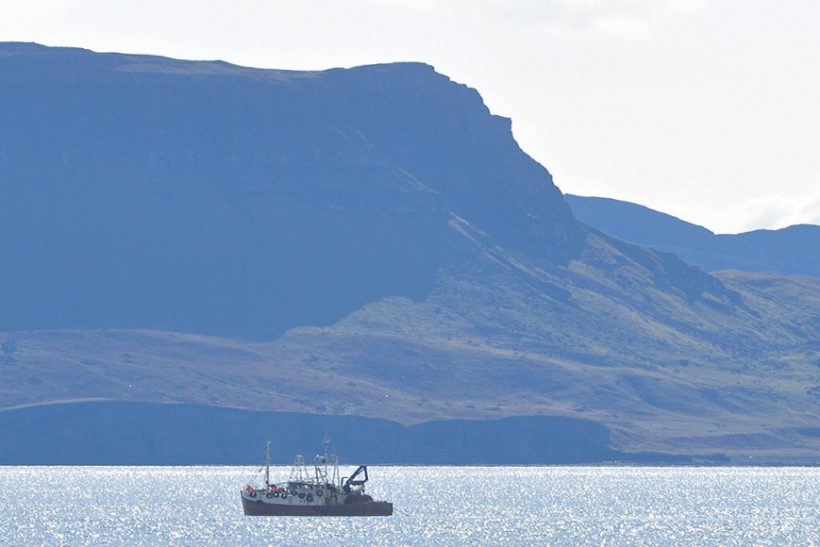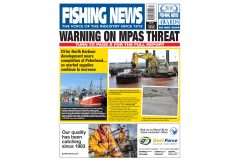NFFO: ‘Industry should not underestimate threat’
Environmentalists and celebrities are campaigning to fast-track marine protected areas (MPAs) and ban all fishing within them regardless of evidence, reports Tim Oliver
The current approach to MPAs is evidence-based and permits human activities like fishing to continue within them if it can be shown that these activities are consistent with protecting the conservation status of the features for which the MPA was designated.
But it emerged at a recent stakeholder meeting with DEFRA secretary of state Michael Gove that environmental groups and celebrities want to overturn the current system and ban any fishing within MPAs, according to the NFFO.
Almost half of the 23 attendees at the meeting were environmental groups, and celebrity chef Hugh Fearnley-Whittingstall was also present. By contrast, only two direct commercial fishing industry groups were present – the NFFO and UKAFPO.
The NFFO warned that the fishing industry should not underestimate the ‘new celebrity-led threat’. Chief executive Barrie Deas, who was present at the stakeholder meeting, told Fishing News: “It is important that the fishing industry pushes back against the environmental lobby who are mounting a campaign for a more purist, less pragmatic and evidence-free approach to MPAs.

NFFO chief executive Barrie Deas: “Use science to decide MPAs policies.”
“Gove’s starting point is to accept their case, and it is important that he receives counterbalancing views from the fishing industry. The way that the landing obligation came into existence shows the danger posed by an emotive campaign based on distortions and lies and a contempt for solid evidence and science.
“It is clear that Michael Gove is predisposed to listen to the siren calls of the more extreme wing of the eco-lobby. We have fought for, and largely achieved, a process based on evidence and dialogue at site and national levels. There is now a real danger that this will now be abandoned in favour of an approach which simply expels fishing and other human activities from MPAs, whether the activity has an adverse impact or not.”
Barrie Deas warned that a policy of banning all fishing in MPAs would lead to displacement of fishing effort to other areas, to the detriment of the industry, other fish stocks and the marine environment.
“People like Callum Roberts (University of York), who are at the forefront of the campaign, are openly contemptuous of the impact that displacement will have on individual fishing businesses. But those impacts are real and can also have serious knock-on effects for other fisheries.
“This well-funded and well-connected lobby paints a desperate picture of decline and destruction in the marine environment completely at odds with the evidence, using selective examples and exaggeration as the currency to whip up another moral panic. We are still trying to deal with the fall-out from the misconceived landing obligation and the problem of chokes in mixed fisheries. If the government goes down this road it will be another hammer-blow for our industry.”
He pointed out that there is no equivalent to this campaign in the terrestrial world. “No one is seriously suggesting that we should return our countryside to the condition it was in before the Iron Age. But that is exactly the objective being voiced for the marine environment. It is extreme, and it is insidious because the pressure is going on behind closed doors.”
He said best-practice world-wide for establishing successful marine protected areas involved a steady, evidence-based approach, based on a continuing dialogue and mutual respect. This is at the heart of an ecosystem approach, where ‘different objectives require carefully calibrated trade-offs. It will be a serious matter if the UK now walks away from this approach from pressure by eco-extremists’.
Barrie Deas said different fishing gears have had various impacts on the seabed and marine environment over the years and it was important that those impacts were measured and managed now and in the future. Fishing had also fed many millions of people and was the basis of an industry that supports many thousands of jobs.
“It is important to keep a sense of proportion and balance in working out how to continue to feed people while minimising adverse environmental impacts. The fear has to be that another celebrity-led campaign will destroy that balance and commitment to evidence, using emotion and half-digested nonsense to achieve it.”
The NFFO is currently taking part in a new joint two-year project with JNCC, Natural England and Bangor University to set up processes for establishing, evaluating and adapting fisheries management in MPAs (Fishing News, 12 April, ‘Industry voice in managing MPAs’.
Gove told: ‘Rely on science’
Barrie Deas wrote to Michael Gove after the meeting urging him to rely on an evidence-based approach to establishing and managing MPAs and of the dangers of displacement for both fishermen and the marine environment.
Displacement is ‘of profound significance’ for fishermen but is ‘equally significant for the achievement of overall good environmental status in the marine environment’, he tells the minister. “It makes no sense to have a pristine area on one side of a line and a degraded marine environment on the other side.”
He fully acknowledges the importance of a healthy and sustainable marine environment and fish stocks but tells Michael Gove the idea that a network of MPAs could be a primary tool for rebuilding and managing commercial fish stocks has been ‘over-sold’.
“There are better, more precise and more effective tools for managing fish stocks, namely TACs, fishing vessel licensing and technical measures.” According to ICES, these measures were leading to a growth of NE Atlantic stocks and MSY levels for the majority of stocks that will deliver ‘high long-term yields’.
He tells the minister, “During the meeting, it was clear that there are two narratives competing for your ear. One, the conservation lobby, paints a desperate picture of destruction, decline and government inertia.
“The other, the fishing lobby, expresses concern over displacement and points to the dramatic reduction in fishing pressure since the crisis of the 1990s, the spectacular success of some of our fish stocks, and the positive trajectory that we are on.
“You and your ministerial colleagues are placed in the difficult position of arbitrating between these competing visions. The conservation lobby is powerful, well-funded and supported by celebrities. The fishing industry feeds us.”
He says that the only way to rationally judge between the two is:
- To rely on a rigorous, evidence-based approach, using the best available science
- To encourage and facilitate a genuine dialogue and analysis at site level as well as national level.
He says policy should build on good work already done in MPAs, that measures the impacts of different fishing gears using objective criteria and enables potential displacement effects to be minimised and features to be protected.
He also says it is important always ‘to distinguish between advocacy and science’.
“The key words that we believe should be central to government policy towards MPAs should be: evidence, objectivity, rigour, coherence, dialogue, balance and proportionality,” he concludes.
Featured image: Small Isles MPA





